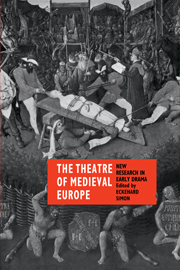Book contents
- Frontmatter
- Contents
- List of contributors
- Preface
- Note on the bibliography and system of references
- List of abbreviations for journals and series
- 1 Introduction: trends in international drama research
- PART I LATIN DRAMA
- PART II ENGLISH DRAMA
- 4 Modern editions of medieval English plays
- 5 The English mystery cycles
- 6 Castles in the air: the morality plays
- 7 ‘All the world was a stage’: Records of Early English Drama
- 8 The staging of medieval English plays
- PART III CONTINENTAL DRAMA
- Bibliography
- Author index to the bibliography
- General index
7 - ‘All the world was a stage’: Records of Early English Drama
Published online by Cambridge University Press: 29 March 2011
- Frontmatter
- Contents
- List of contributors
- Preface
- Note on the bibliography and system of references
- List of abbreviations for journals and series
- 1 Introduction: trends in international drama research
- PART I LATIN DRAMA
- PART II ENGLISH DRAMA
- 4 Modern editions of medieval English plays
- 5 The English mystery cycles
- 6 Castles in the air: the morality plays
- 7 ‘All the world was a stage’: Records of Early English Drama
- 8 The staging of medieval English plays
- PART III CONTINENTAL DRAMA
- Bibliography
- Author index to the bibliography
- General index
Summary
Over the past two decades, an increasing number of scholars have turned their attention to the surviving external evidence of dramatic activity in Great Britain in the late Middle Ages and early Renaissance. Earlier scholars led the way. J. O. Halliwell-Phillipps, in the nineteenth century, toured the provincial towns in search of Shakespeare. J. Tucker Murray, less particular in his search, gathered evidence of the Elizabethan and later Stuart dramatic companies. Local antiquarians, such as the three generations of the Raine family in York, toiled over editions and collections of local records published by antiquarian societies. E. K. Chambers used many of these works to compile his still important general studies of early English theatre.
The year 1955 is a seminal year in the study of early drama, for in that year two very different books appeared. The one, English Religious Drama of the Middle Ages, by Hardin Craig, was the culmination of a lifetime of study and marked the end of the old-style scholarship that tended to generalise, homogenise and patronise the religious drama of the late Middle Ages. The other, Mediaeval Drama in Chester, by F. M. Salter, was also written by a man at the end of a long and distinguished career. Salter presented his material first as one of the prestigious series of lectures, the Alexander Lectures, at the University of Toronto.
- Type
- Chapter
- Information
- The Theatre of Medieval EuropeNew Research in Early Drama, pp. 117 - 129Publisher: Cambridge University PressPrint publication year: 1991
- 1
- Cited by



